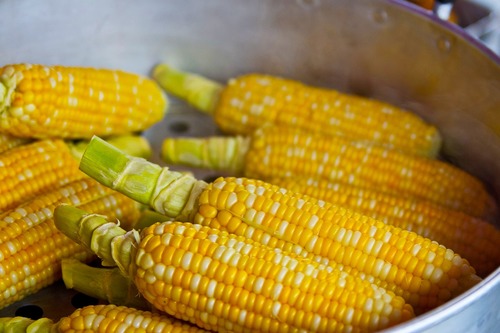Is Corn Bad For You?
Also Known As: corn on the cob
Short answer
Unless it's natural, organic and free from GMOs, corn is bad for you and may lead to unwanted side effects.
Recommended Alternative
A fairly even ratio of beneficial and harmful qualities. Moderation is important. Very general topics that can lean towards both sides of the spectrum will be placed here as well. Rice, for example, can be good or bad depending on the type.
View Full Grading System
Category 'A'
Very healthy and numerous health benefits. Side effects are rare. Things rated an 'A+' are typically necessary for survival (for example, water).
Very healthy and numerous health benefits. A few harmful qualities may be associated, but only under certain circumstances such as an allergic reaction.
Very healthy and numerous health benefits. Harmful qualities may be associated, but aren't usually serious.
It is important to note that even the best things in life can become bad in immoderate amounts. So, although something may be rated an 'A+', overconsumption/overdoing can bring unwanted effects.
Category 'B'
Very beneficial to your health. Things rated a 'B+' may have a few harmful qualities to pay attention to.
Overall beneficial to your health. Things rated a 'B' may have some harmful qualities to pay attention to.
More beneficial to your health than not. However, harmful qualities are most likely associated and shouldn't be overlooked.
The main difference between category 'A' and category 'B' is the harmful qualities typically present in 'B' items. Serious side effects are usually uncommon, but are still possible and should be taken note of.
Category 'C'
Both beneficial and harmful qualities associated. Things rated a 'C+' are typically a bit more on the beneficial side. Still, moderation is important.
A fairly even ratio of beneficial and harmful qualities. Moderation is important. Very general topics that can lean towards both sides of the spectrum will be placed here as well. Rice, for example, can be good or bad depending on the type.
More harmful than beneficial. Side effects are common, especially when consumed/done excessively. Moderation is very important.
Category 'C' usually denotes to both good and bad qualities. When it comes to this category, it is important to keep this word in mind: moderation.
Category 'D'
Harmful to your health. Although benefits may be associated, the bad most likely outweighs the good. Moderation is very important.
Harmful to your health. A few benefits may be associated, but the bad outweighs the good. Moderation is extremely important.
Harmful to your health. Very few, if any, benefits are present. Things in this category should be avoided as much as possible.
Category 'D' is typically for things that are more harmful than beneficial. While consuming/doing something unhealthy once in a blue moon shouldn't hurt, we definitely recommend eliminating 'D' items as a regular part of your routine/diet.
Category 'F'
Category 'F' is for things that fail to bring anything beneficial to the table, and are very harmful to your health. We recommend completely avoiding anything in this category. Long-term side effects of 'F' items are usually very serious.
Category 'N'
'N' stands for neutral. Things placed into this category are generally (a) neither good nor bad for you, or (b) lack the necessary evidence to reach any conclusions.
Long answer
The problem with most corn is that it contains GMOs - and we all know that genetically modified food is frowned upon and can result in unpredictable side effects. There are several reasons why corn is genetically modified, but the main one is this: corn, like many crops, is pumped with pesticides and herbicides and genetically modifying the corn can increase resistance against the harmful chemicals. Although GMOs are still being studied day on out, many scientists confirm that they have the potential to create new diseases, increase the risk of cancer, damage vital organs, cause infertility, and overall create a very toxic environment inside of your body.
Eating natural corn is the best way to consume this food. That's the way it's always been. In fact, our ancestors have been eating it this way for centuries - long before chemicals, additives and sweeteners became part of the modern diet. However, regardless of the way it's been produced, corn still contains a lot of goodness. Expect to find vitamin C, vitamin E, and loads of antioxidants in each serving. It's also jam-packed full of fiber which can aid digestion and keep you feeling fuller for longer.
Corn also contains a high amount of potassium (about 10 percent of your recommended daily intake in one cup), and the antioxidants zeaxanthin and lutein - which help keep your eyes healthy.
Possible short-term side effects
- gmo corn can cause:
-
allergies
-
toxin build-up
-
nutritional deficiencies
Possible long-term side effects
- gmo corn can cause:
-
new diseases
-
cancer
-
infertility
-
damage to vital organs
-
poor insulin regulation
Ingredients to be aware of
- gmos
-
sodium (canned corn)
Benefits
- promotes eye health
-
aids digestion
-
enhances satiety
-
great source of antioxidants
-
great source of potassium
Healthier alternatives
Our Wellness Pick
(what is this?)
Organic Sprouted Corn Meal
- Enhanced nutrient profile
- Certified Organic
- Non-GMO
- Gluten-Free option
- Easy to digest
Learn More!
Please turn your Ad Blocker off to see this content. Thank you!
Thank you for your feedback!
Written by Healthy Living 35
Published on: 12-29-2015
Last updated: 12-15-2023
Thank you for your feedback!
Written by Healthy Living 35
Published on: 12-29-2015
Last updated: 12-15-2023

 Approved by
Approved by 















